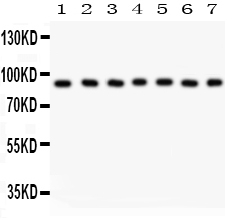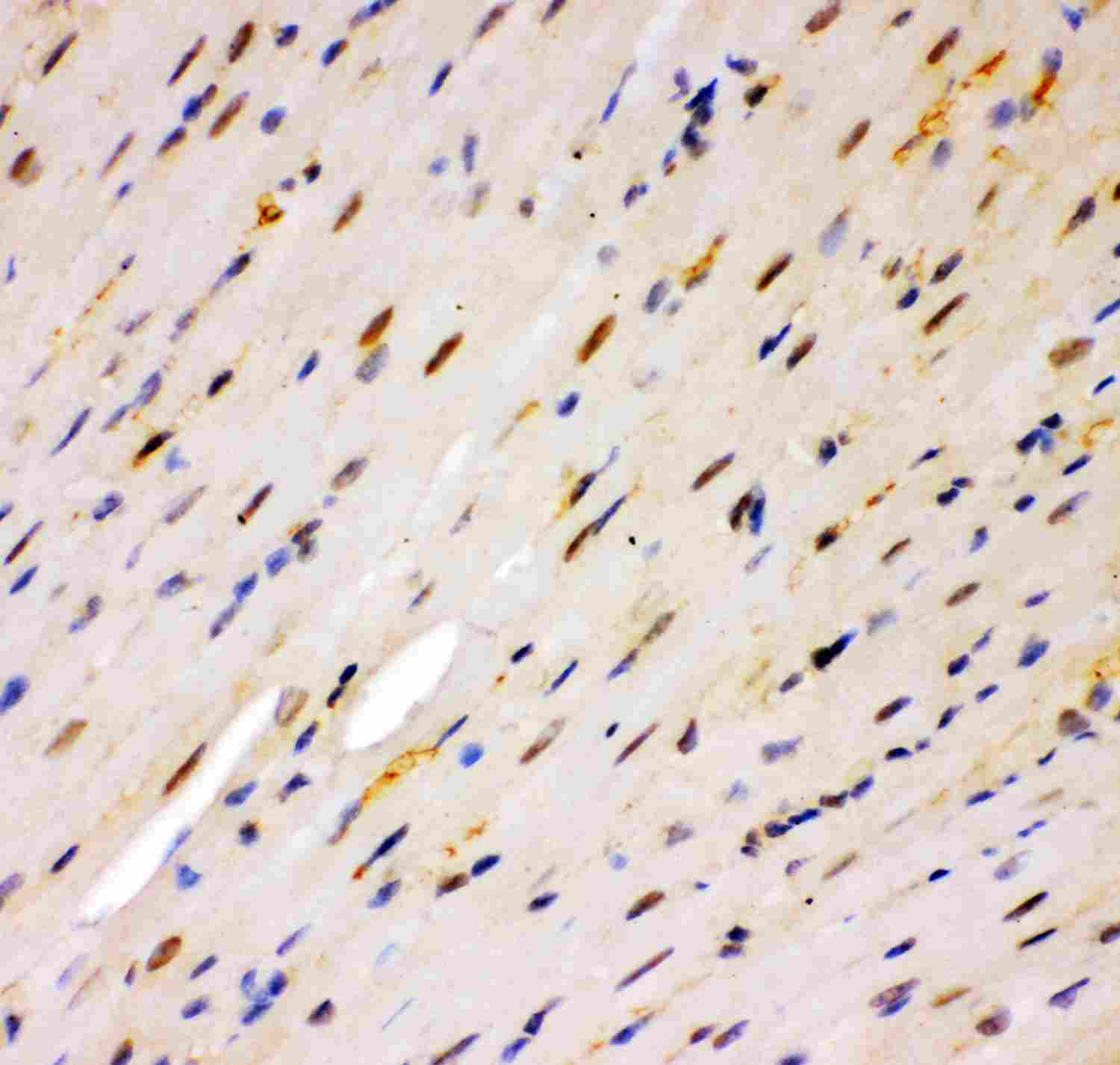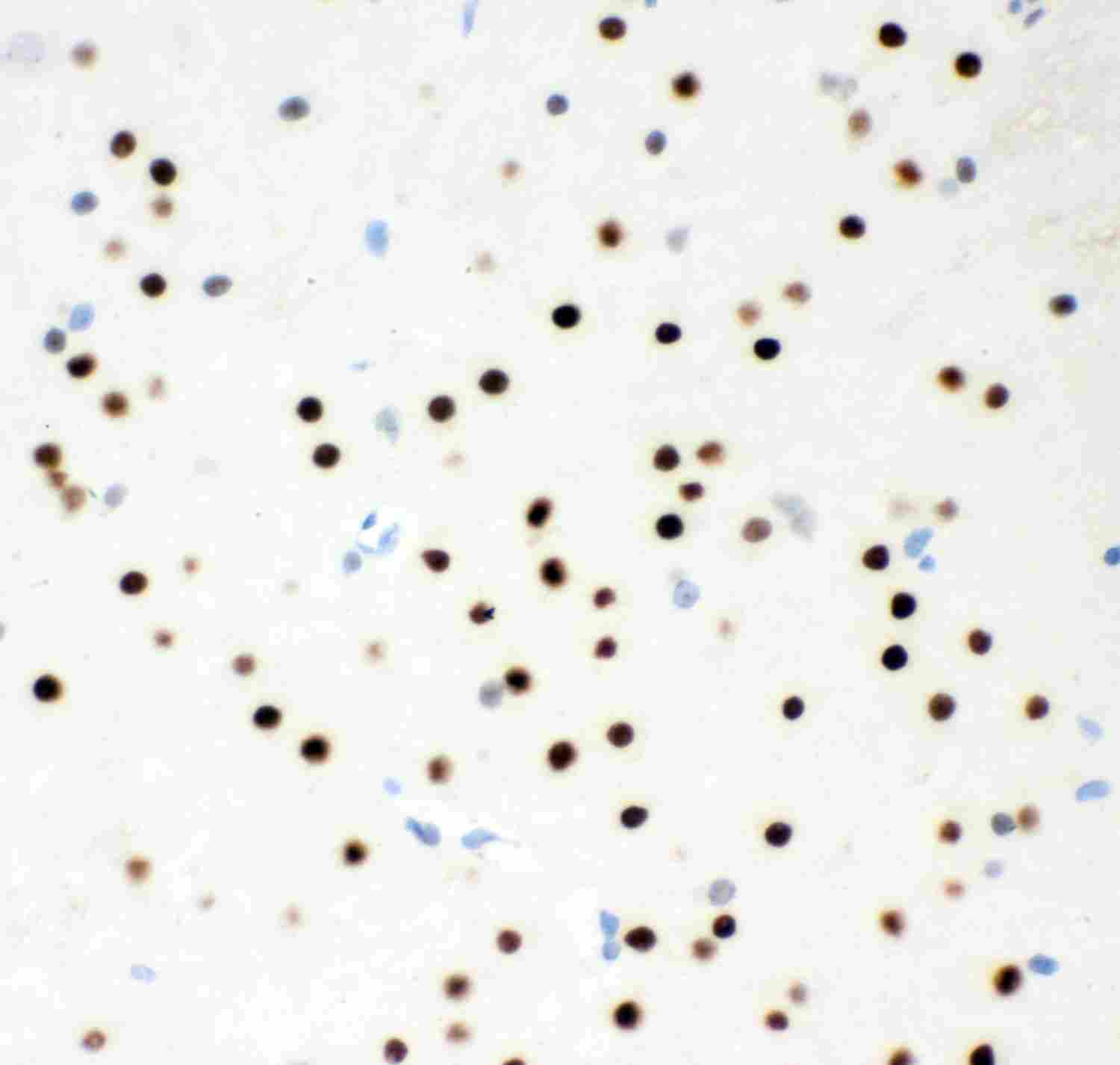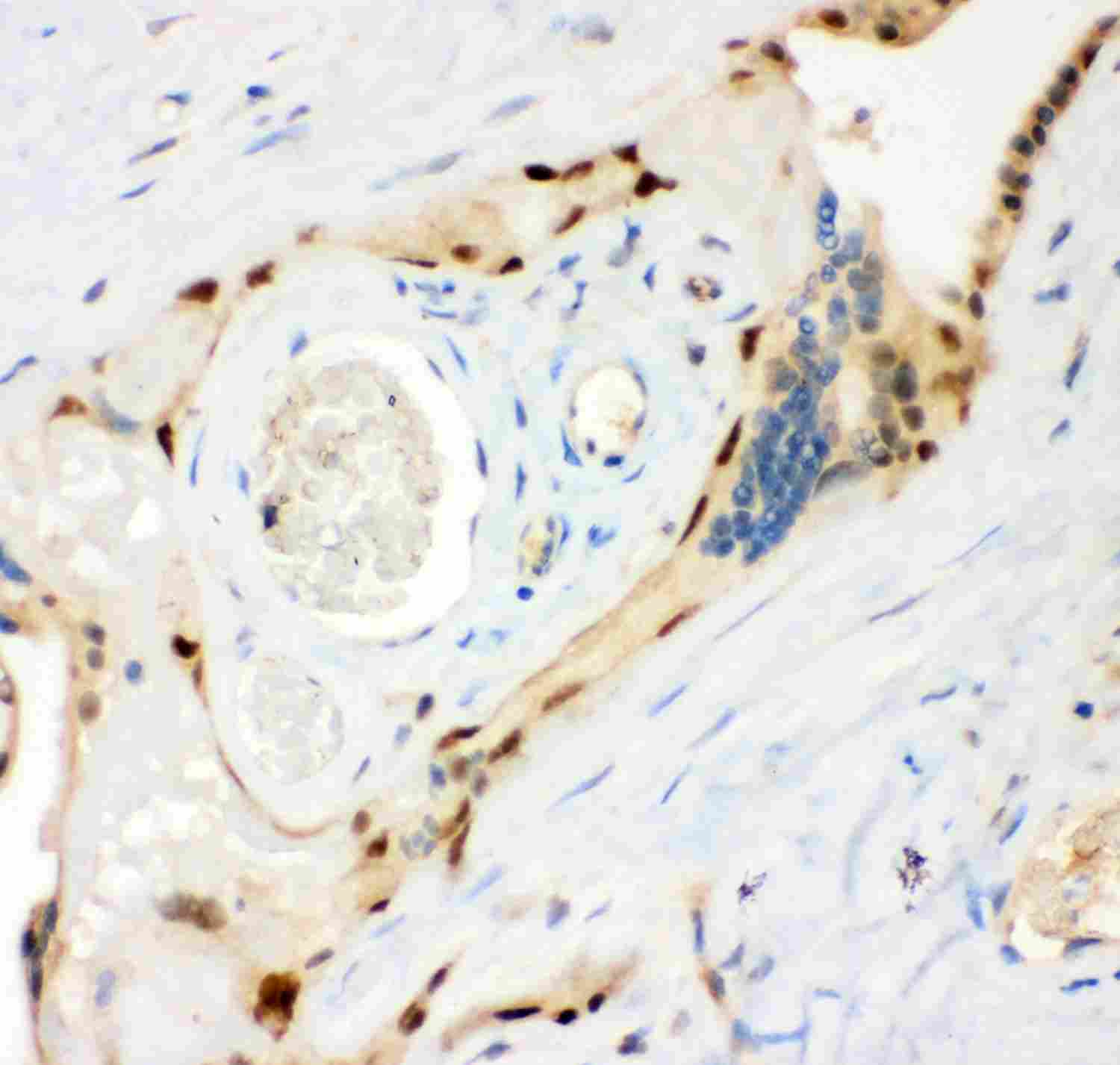Anti-MSK1 Picoband Antibody
- SPECIFICATION
- CITATIONS
- PROTOCOLS
- BACKGROUND

Application
| WB, IHC-P, ICC |
|---|---|
| Primary Accession | O75582 |
| Host | Rabbit |
| Reactivity | Human, Mouse, Rat |
| Clonality | Polyclonal |
| Format | Lyophilized |
| Description | Rabbit IgG polyclonal antibody for Ribosomal protein S6 kinase alpha-5(RPS6KA5) detection. Tested with WB, IHC-P, ICC in Human;Mouse;Rat. |
| Reconstitution | Add 0.2ml of distilled water will yield a concentration of 500ug/ml. |
| Gene ID | 9252 |
|---|---|
| Other Names | Ribosomal protein S6 kinase alpha-5, S6K-alpha-5, 2.7.11.1, 90 kDa ribosomal protein S6 kinase 5, Nuclear mitogen- and stress-activated protein kinase 1, RSK-like protein kinase, RSKL, RPS6KA5, MSK1 |
| Calculated MW | 89865 MW KDa |
| Application Details | Immunocytochemistry , 0.5-1 µg/ml, Human, - Immunohistochemistry(Paraffin-embedded Section), 0.5-1 µg/ml, Human, Mouse, Rat, By Heat Western blot, 0.1-0.5 µg/ml, Human, Rat |
| Subcellular Localization | Nucleus. Cytoplasm. Predominantly nuclear. Exported into cytoplasm in response to glucocorticoid. |
| Tissue Specificity | Widely expressed with high levels in heart, brain and placenta. Less abundant in lung, kidney and liver. . |
| Protein Name | Ribosomal protein S6 kinase alpha-5 |
| Contents | Each vial contains 5mg BSA, 0.9mg NaCl, 0.2mg Na2HPO4, 0.05mg NaN3. |
| Immunogen | E.coli-derived human MSK1 recombinant protein (Position: V540-Q665). Human MSK1 shares 98% amino acid (aa) sequence identity with mouse MSK1. |
| Purification | Immunogen affinity purified. |
| Cross Reactivity | No cross reactivity with other proteins |
| Storage | At -20˚C for one year. After r˚Constitution, at 4˚C for one month. It˚Can also be aliquotted and stored frozen at -20˚C for a longer time.Avoid repeated freezing and thawing. |
| Sequence Similarities | Belongs to the protein kinase superfamily. AGC Ser/Thr protein kinase family. S6 kinase subfamily. |
| Name | RPS6KA5 |
|---|---|
| Synonyms | MSK1 |
| Function | Serine/threonine-protein kinase that is required for the mitogen or stress-induced phosphorylation of the transcription factors CREB1 and ATF1 and for the regulation of the transcription factors RELA, STAT3 and ETV1/ER81, and that contributes to gene activation by histone phosphorylation and functions in the regulation of inflammatory genes (PubMed:11909979, PubMed:12569367, PubMed:12763138, PubMed:18511904, PubMed:9687510, PubMed:9873047). Phosphorylates CREB1 and ATF1 in response to mitogenic or stress stimuli such as UV-C irradiation, epidermal growth factor (EGF) and anisomycin (PubMed:11909979, PubMed:9873047). Plays an essential role in the control of RELA transcriptional activity in response to TNF and upon glucocorticoid, associates in the cytoplasm with the glucocorticoid receptor NR3C1 and contributes to RELA inhibition and repression of inflammatory gene expression (PubMed:12628924, PubMed:18511904). In skeletal myoblasts is required for phosphorylation of RELA at 'Ser-276' during oxidative stress (PubMed:12628924). In erythropoietin-stimulated cells, is necessary for the 'Ser-727' phosphorylation of STAT3 and regulation of its transcriptional potential (PubMed:12763138). Phosphorylates ETV1/ER81 at 'Ser-191' and 'Ser-216', and thereby regulates its ability to stimulate transcription, which may be important during development and breast tumor formation (PubMed:12569367). Directly represses transcription via phosphorylation of 'Ser-1' of histone H2A (PubMed:15010469). Phosphorylates 'Ser-10' of histone H3 in response to mitogenics, stress stimuli and EGF, which results in the transcriptional activation of several immediate early genes, including proto-oncogenes c-fos/FOS and c-jun/JUN (PubMed:12773393). May also phosphorylate 'Ser-28' of histone H3 (PubMed:12773393). Mediates the mitogen- and stress-induced phosphorylation of high mobility group protein 1 (HMGN1/HMG14) (PubMed:12773393). In lipopolysaccharide-stimulated primary macrophages, acts downstream of the Toll-like receptor TLR4 to limit the production of pro-inflammatory cytokines (By similarity). Functions probably by inducing transcription of the MAP kinase phosphatase DUSP1 and the anti-inflammatory cytokine interleukin 10 (IL10), via CREB1 and ATF1 transcription factors (By similarity). Plays a role in neuronal cell death by mediating the downstream effects of excitotoxic injury (By similarity). Phosphorylates TRIM7 at 'Ser-107' in response to growth factor signaling via the MEK/ERK pathway, thereby stimulating its ubiquitin ligase activity (PubMed:25851810). |
| Cellular Location | Nucleus. Cytoplasm. Note=Predominantly nuclear. Exported into cytoplasm in response to glucocorticoid |
| Tissue Location | Widely expressed with high levels in heart, brain and placenta. Less abundant in lung, kidney and liver |

Thousands of laboratories across the world have published research that depended on the performance of antibodies from Abcepta to advance their research. Check out links to articles that cite our products in major peer-reviewed journals, organized by research category.
info@abcepta.com, and receive a free "I Love Antibodies" mug.
Provided below are standard protocols that you may find useful for product applications.
Background
Ribosomal protein S6 kinase alpha-5, also known as MSK1, is an enzyme that in humans is encoded by the RPS6KA5 gene. It belongs to the AGC family of kinases. MSK1 gene is mapped to chromosome 14q31-q32. Northern blot analysis indicated that MSK1 was expressed as a 4-kb mRNA in all tissues tested, with the highest levels of expression in brain, muscle, and placenta. MSK1 was activated in vitro and in vivo by either ERK or SAPK2 proteins. It has been found that MSK1, rather than MAPKAP-K1 or MAPKAP-K2/K3, mediates activation of the cAMP response element-binding protein and activating transcription factor-1 by either growth factors or stress signals.
If you have used an Abcepta product and would like to share how it has performed, please click on the "Submit Review" button and provide the requested information. Our staff will examine and post your review and contact you if needed.
If you have any additional inquiries please email technical services at tech@abcepta.com.













 Foundational characteristics of cancer include proliferation, angiogenesis, migration, evasion of apoptosis, and cellular immortality. Find key markers for these cellular processes and antibodies to detect them.
Foundational characteristics of cancer include proliferation, angiogenesis, migration, evasion of apoptosis, and cellular immortality. Find key markers for these cellular processes and antibodies to detect them. The SUMOplot™ Analysis Program predicts and scores sumoylation sites in your protein. SUMOylation is a post-translational modification involved in various cellular processes, such as nuclear-cytosolic transport, transcriptional regulation, apoptosis, protein stability, response to stress, and progression through the cell cycle.
The SUMOplot™ Analysis Program predicts and scores sumoylation sites in your protein. SUMOylation is a post-translational modification involved in various cellular processes, such as nuclear-cytosolic transport, transcriptional regulation, apoptosis, protein stability, response to stress, and progression through the cell cycle. The Autophagy Receptor Motif Plotter predicts and scores autophagy receptor binding sites in your protein. Identifying proteins connected to this pathway is critical to understanding the role of autophagy in physiological as well as pathological processes such as development, differentiation, neurodegenerative diseases, stress, infection, and cancer.
The Autophagy Receptor Motif Plotter predicts and scores autophagy receptor binding sites in your protein. Identifying proteins connected to this pathway is critical to understanding the role of autophagy in physiological as well as pathological processes such as development, differentiation, neurodegenerative diseases, stress, infection, and cancer.






